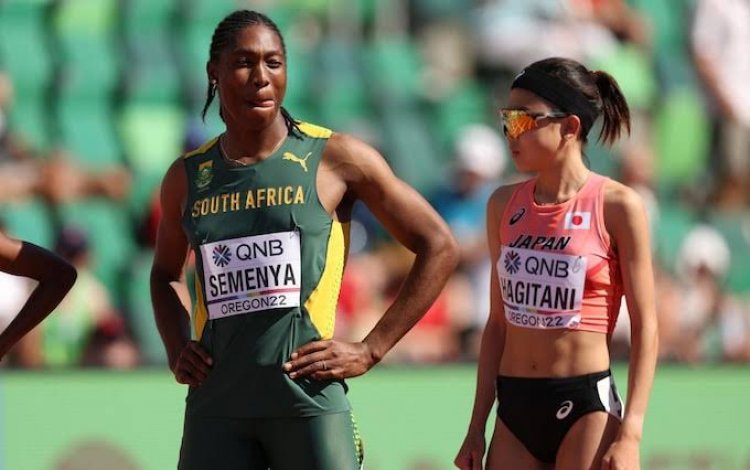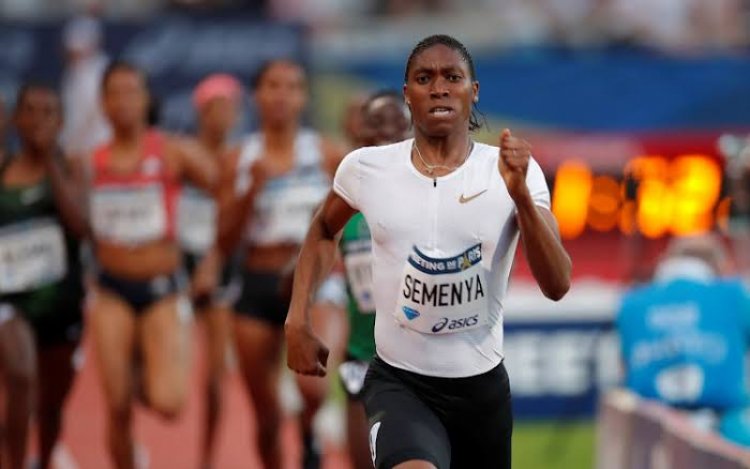Oregon 2022: Semenya fails to qualify for next round gets Coe backing

South Africa star Caster Semenya finished 13th and failed to advance in the women's 5000 meters at the world championships, an expected result for the South African who is barred from her best event because of rules that demand she take hormone-reducing drugs to enter certain races.
Semenya, who has two Olympic and three world titles in the 800m, has been kept out of that race in big events since 2019, after losing an appeal of a World Athletics regulation that made women with certain intersex condition ineligible for races of between 400m and one mile.
Semenya finished the 12 1/2-lap race, held on a blistering 32 Celsius afternoon, in 15 minutes, 46.12 seconds.
That was 54 seconds behind the winner of the heat, Gudaf Tsegay of Ethiopia, and 53 seconds outside of the fifth and last automatic qualifying spot into the final.
The only surprise in any of that was that she came to Oregon to compete. Her personal best in the race is 15:31.50, which is outside the world-championships qualifying standard.
But she moved into the race after some higher-ranked runners did not enter.
Her case is the most recognisable in a number of instances involving intersex and transgender athletes in sports. Semenya is not transgender, but her case carries strong implications for how transgender athletes are treated and classified.
Semenya has been a vocal critic of the rules, most recently saying through her lawyer that they are “an affront to the spirit of the sport.”

Semenya hung in the middle of the lead pack of the 18-woman race for about three laps, then things started stringing out. Halfway through the 5000m, she had fallen to 13th – racing in a group of three runners some 80 metres behind the lead group. With about three laps to go, Semenya was in a familiar place – running all alone on the track – but she was in 13th.
There were no runners within 50 metres of her on either side when she crossed the finish line to a notable burst of applause, same as she received when she was introduced at the starting line.
While most of the runners collapsed to the track at the end, Semenya paced around, breathing heavily, with her hands on her hips.
She high-fived a few of the runners, grabbed a wet towel to put on the back of her neck, then dug around in a cooler for something to drink before heading up a set of stairs that lead away from the track.
World Athletics President Sebastian Coe took a sideswipe at "second-rate sociologists" who have questioned the scientific basis on which the rules were altered.
"She's eligible to be here," Coe said of Semenya, who missed qualification initially when she only finished sixth at the African Championships last month, but has benefited from a number of athletes dropping out and, world-ranked 81st, will run in the heats on the sixth day of competition in Eugene.
"If she chooses to compete in a distance that is not a restricted distance that's entirely up to her and she'll get the same treatment and same services as any athlete that's legitimately here."
Semenya is one of a handful of "restricted" athletes in Oregon, but Coe told AFP he didn't want "these athletes to go away any time soon"
"My whole approach to this has actually been about inclusivity," added Coe.
"I didn't come into the sport to stop people competing."
However Coe, who before Jake Wightman's victory was the last Briton to win a global 1500m gold when he retained his Olympic title at the 1984 Los Angeles Olympics, stressed that gender eligibility rules would not be changed any time soon.
"We've always been guided by the science and science is pretty clear: we know that testosterone is the key determinant in performance," he said.
"I'm really over having any more of these discussions with second-rate sociologists who sit there trying to tell me or the science community that there may be some issue.
"There isn't; testosterone is the key determinant in performance."
Coe said it was his responsibility to "protect the integrity of women's sport".
"We have two categories in our sport: one is age and one is gender," added the World Athletics President.

"Age because we think it's better that Olympic champions don't run against 14-year-olds in community sports and gender because if you don't have a gender separation, no woman would ever win another sporting event."
Coe said current restrictions on events from the 400m to the mile were "not set in tablets of stone".
"If we find there's an impact in other events, we will have to take that into consideration," he said, adding that it was "not about an individual, not about a country, not about a continent".
Coe added that we would not speculate on widening restrictions to events like the 200m, a distance that Namibian athlete Christine Mboma took silver in at the Tokyo 2020 Olympic Games, saying he would be "guided on science".




















